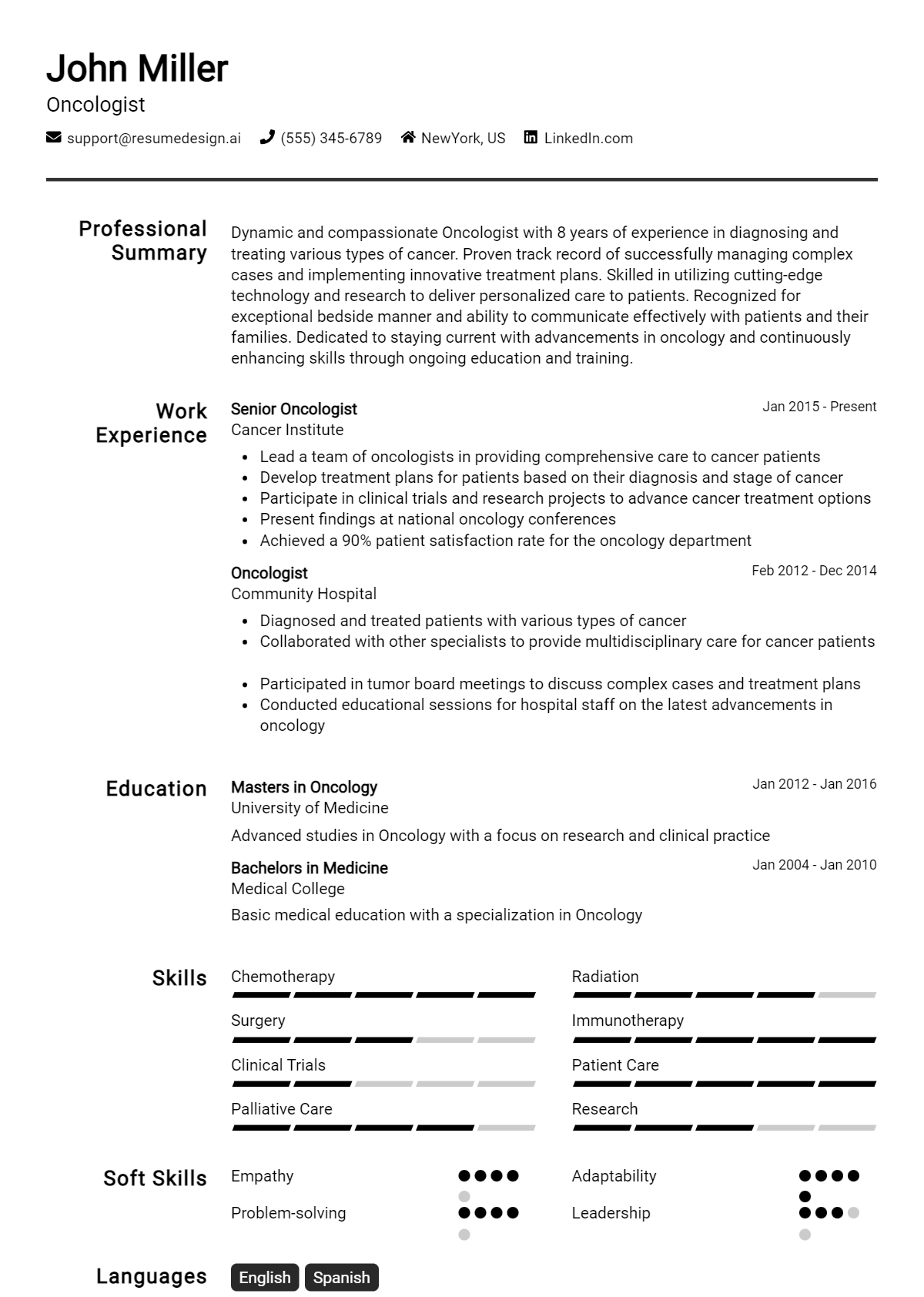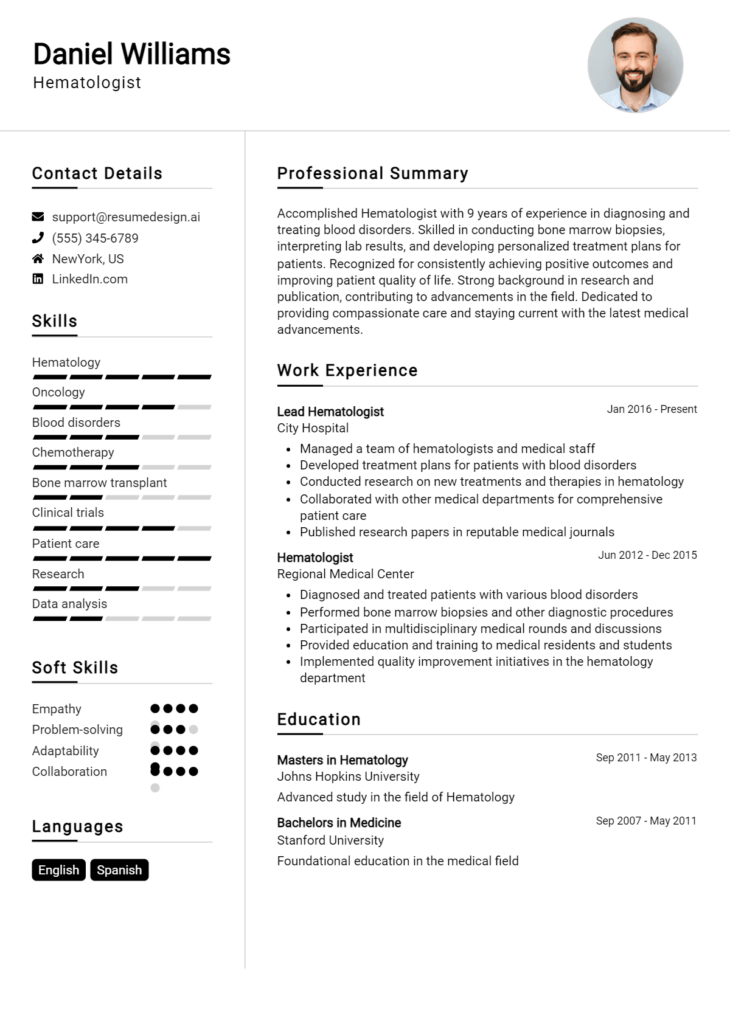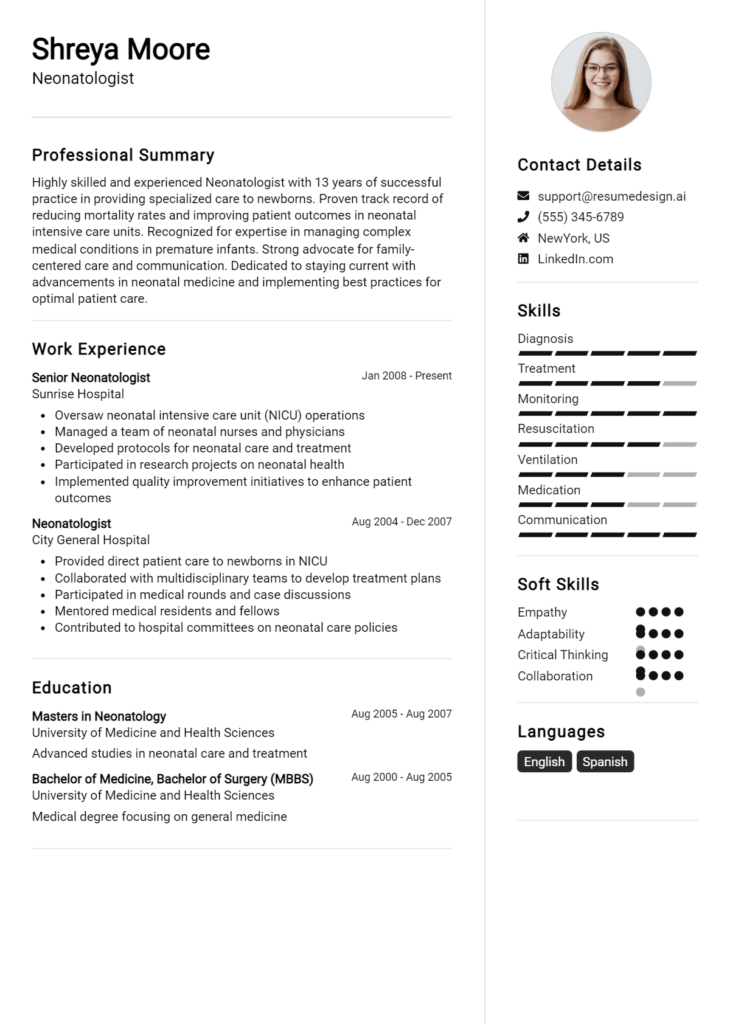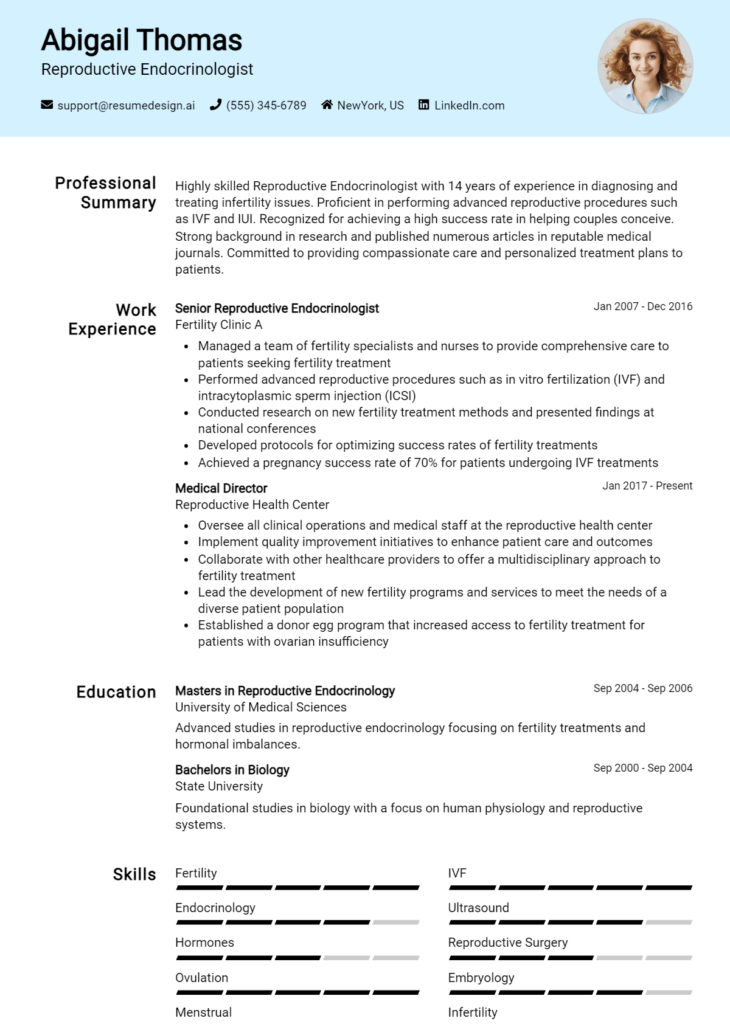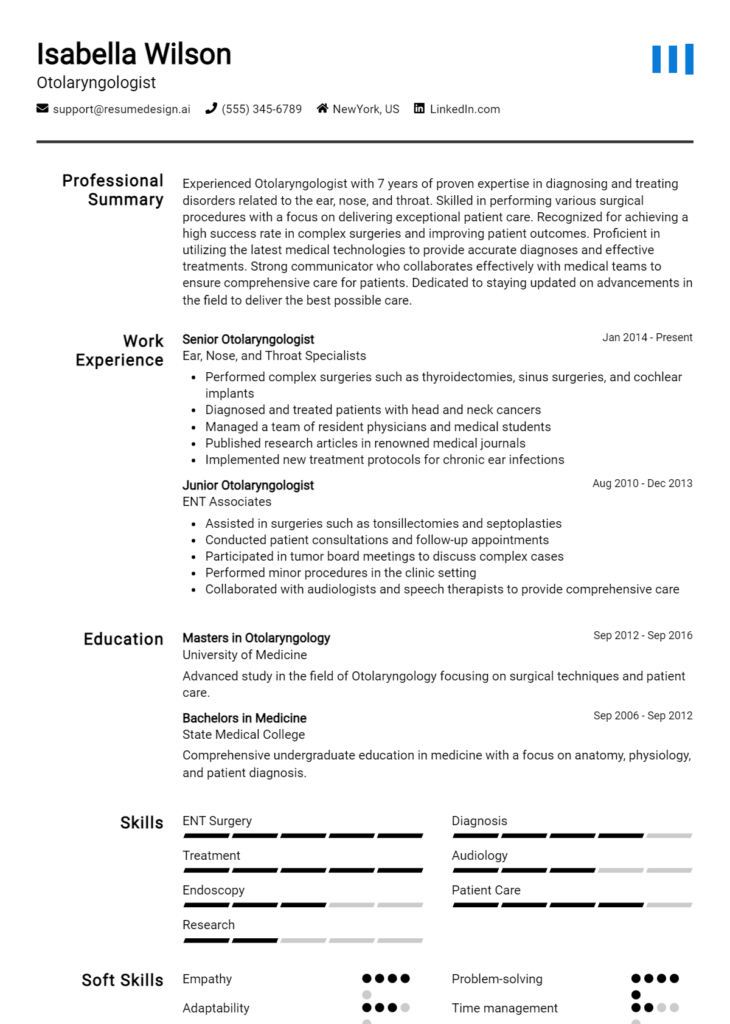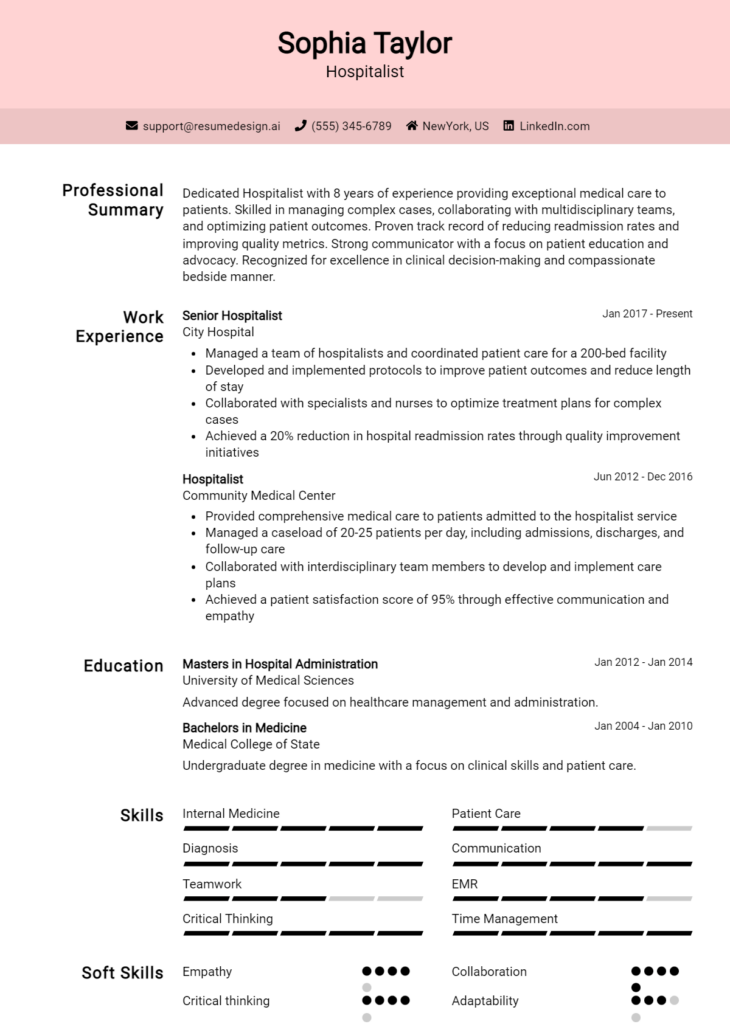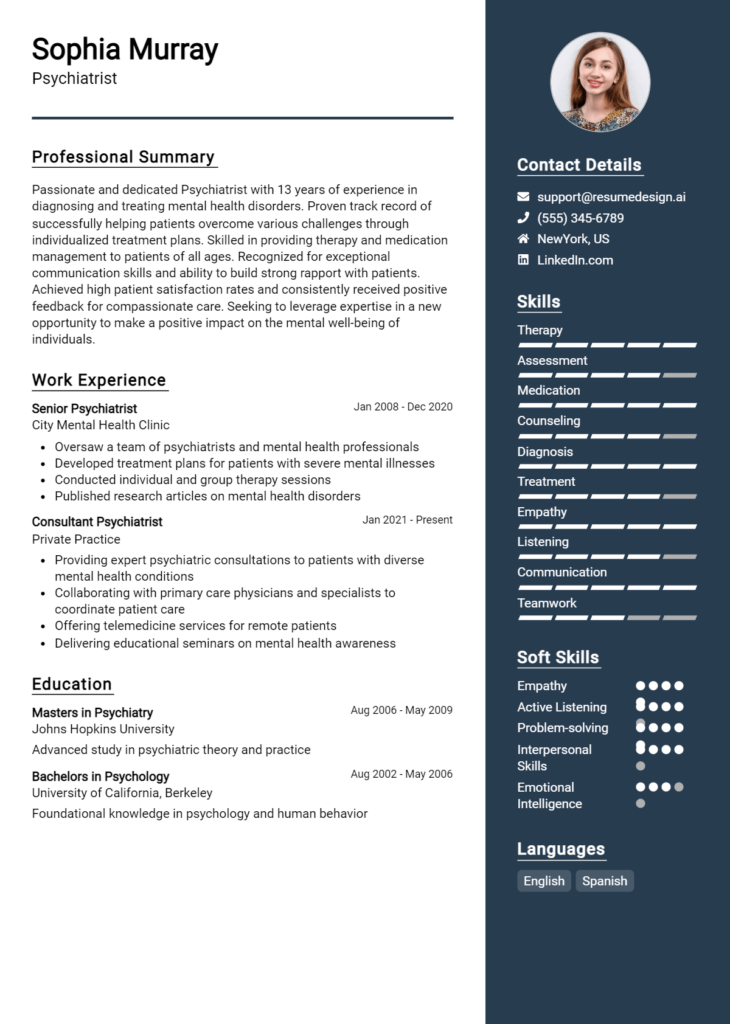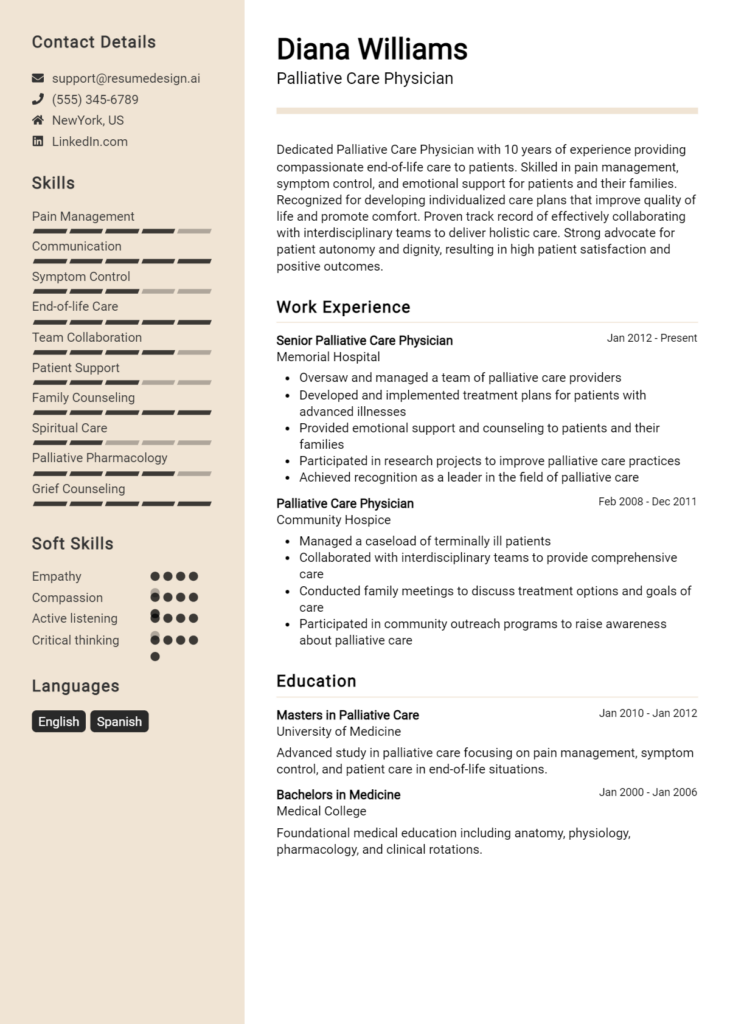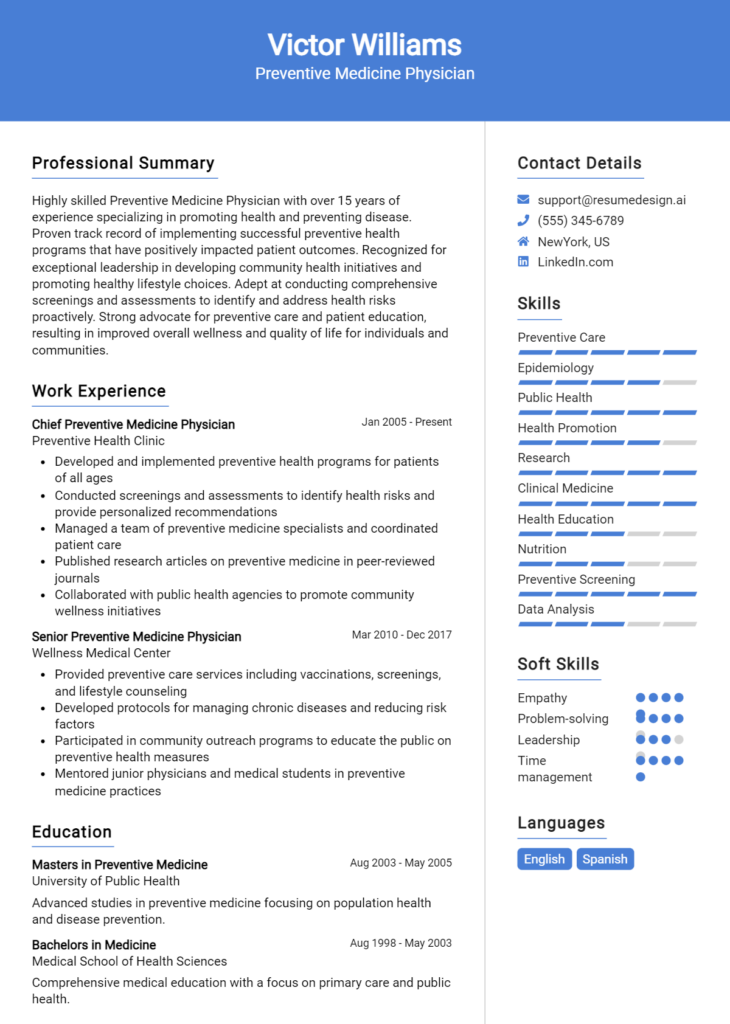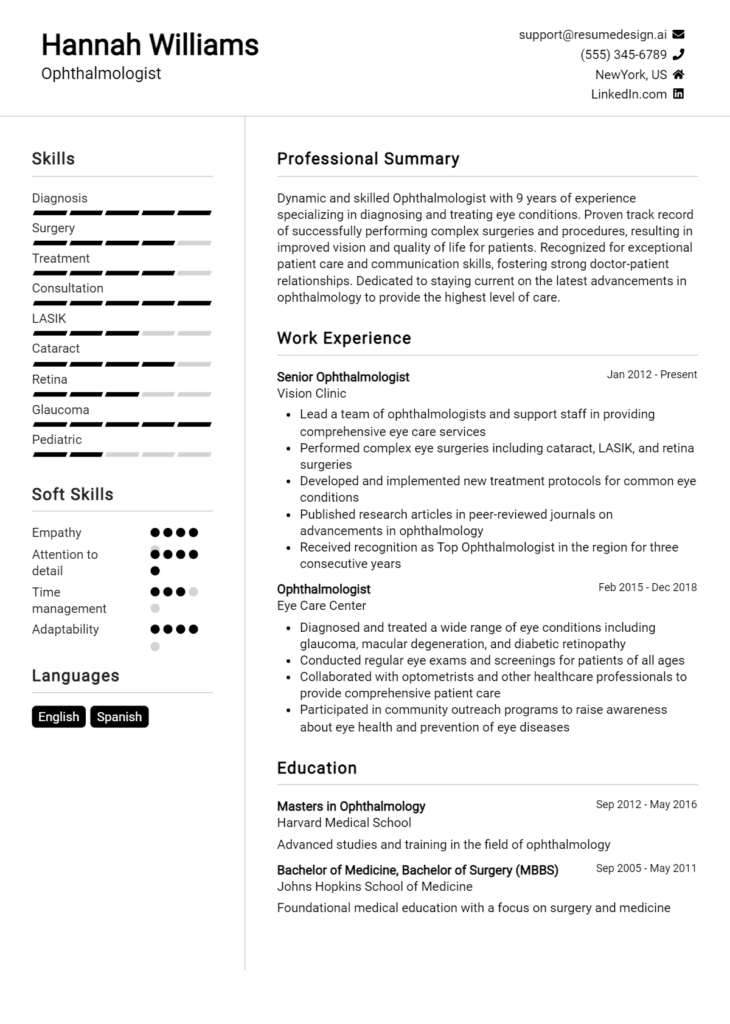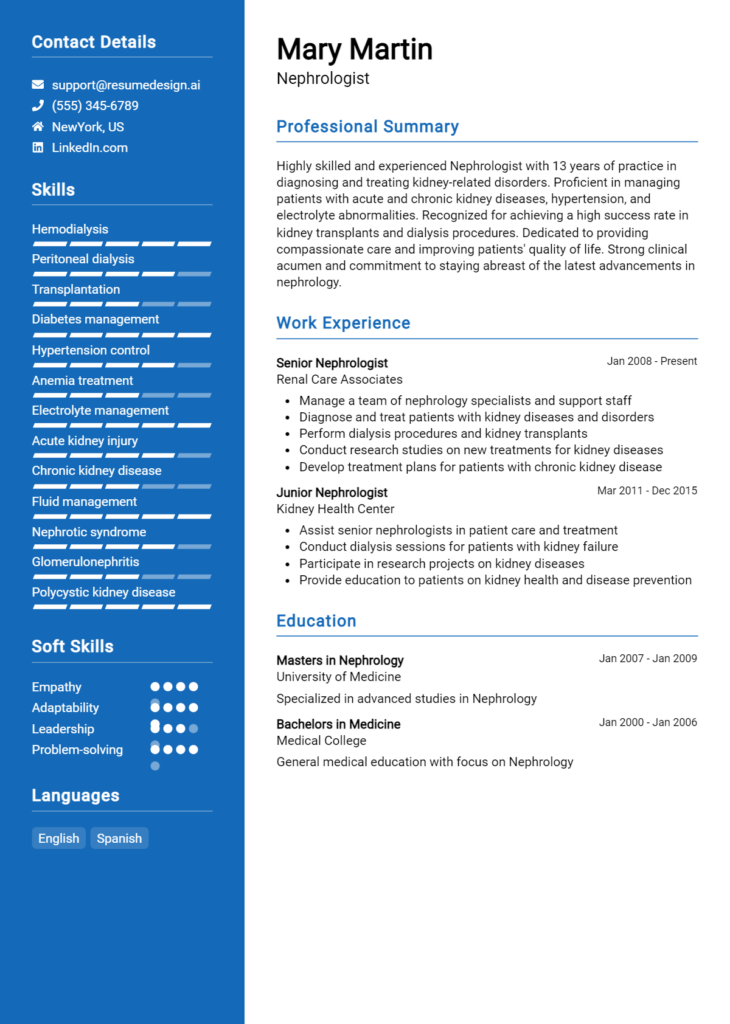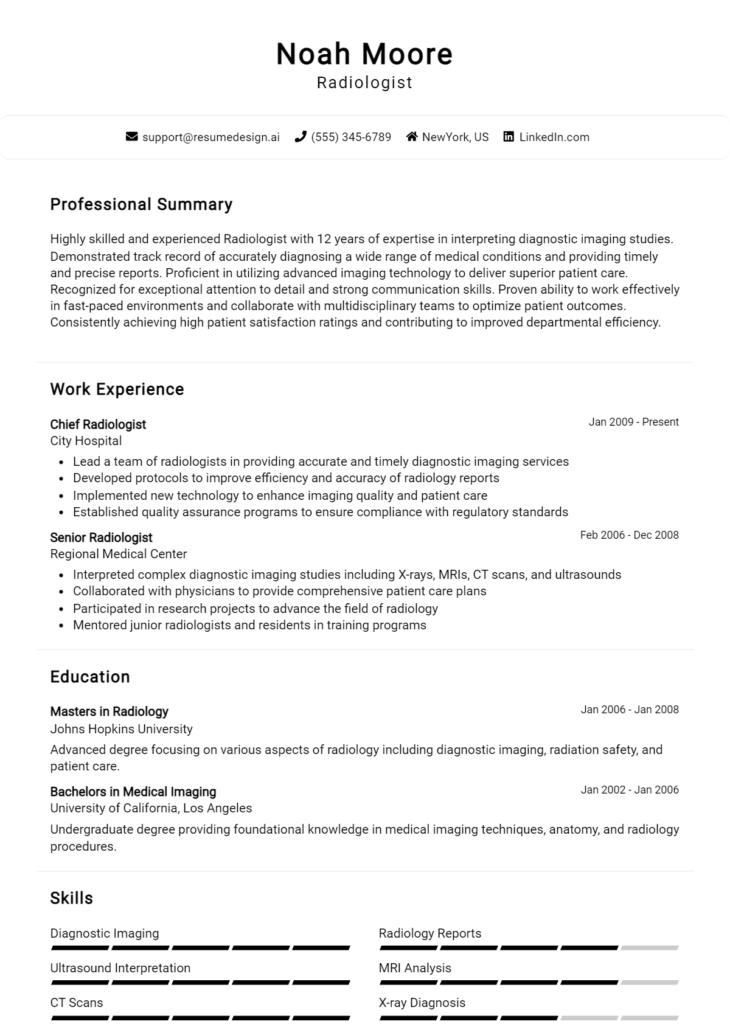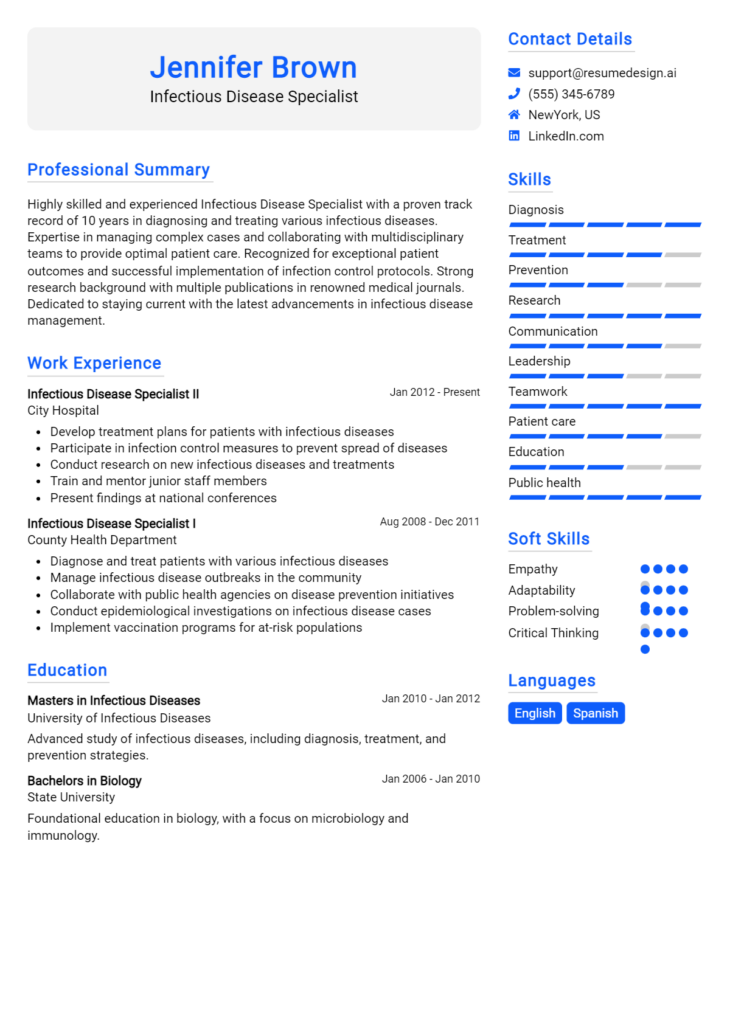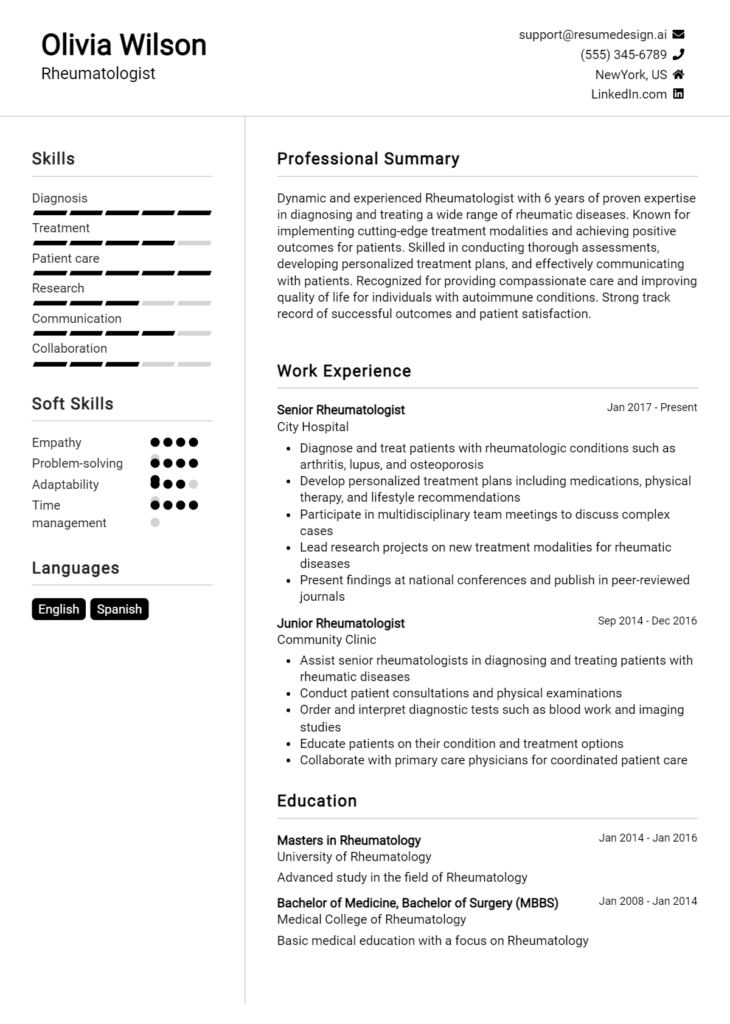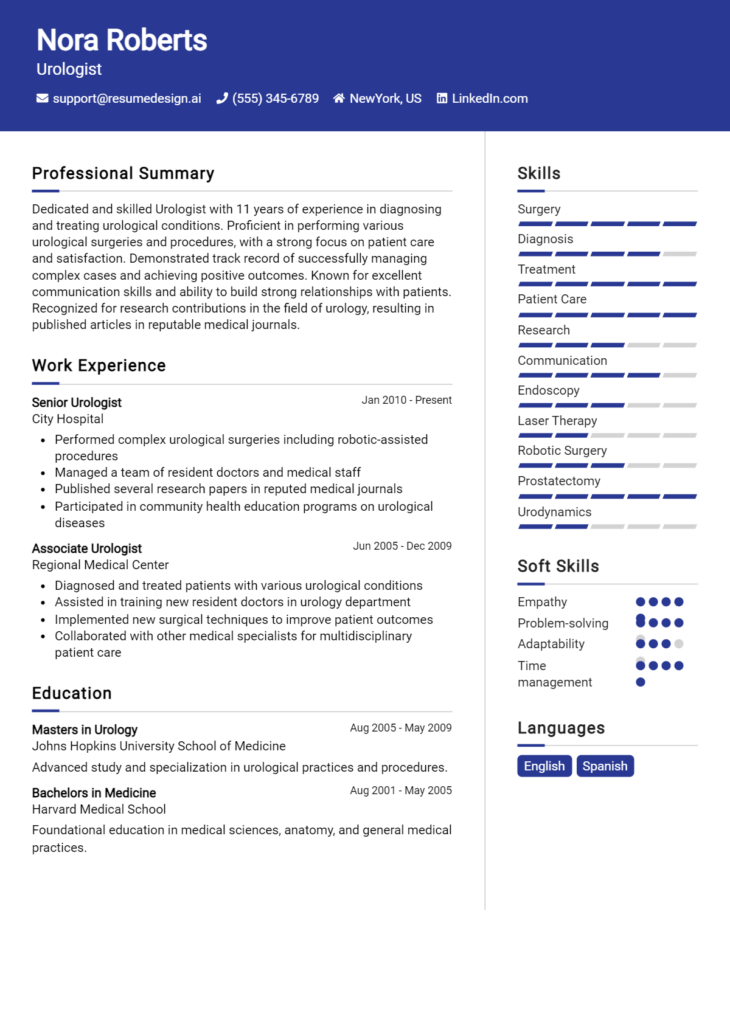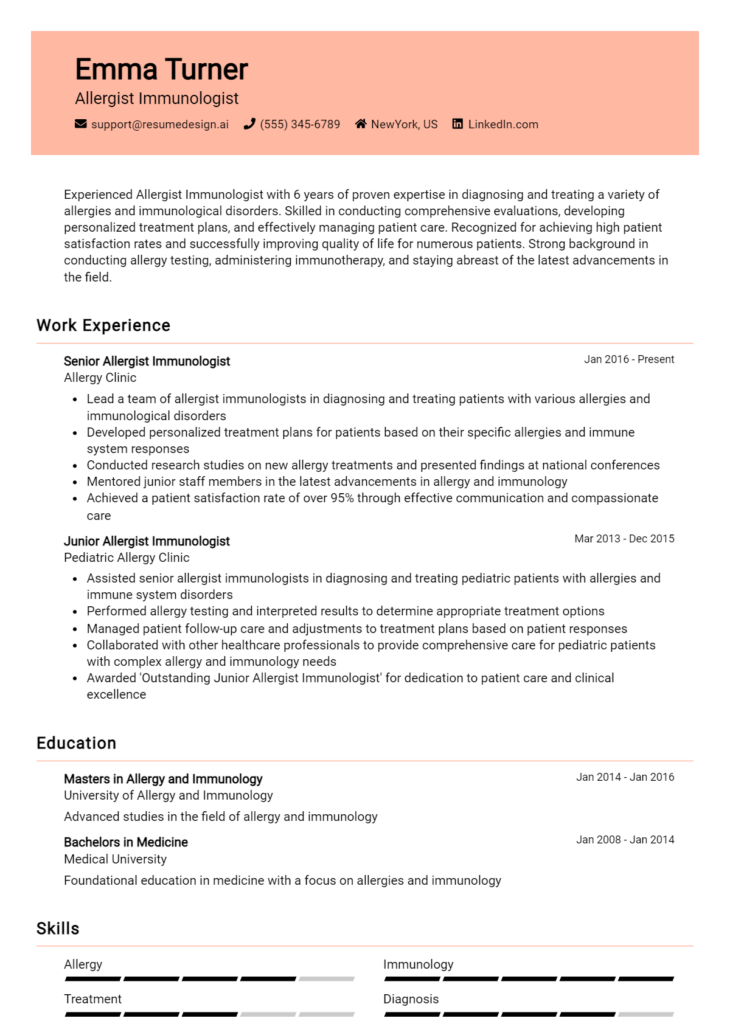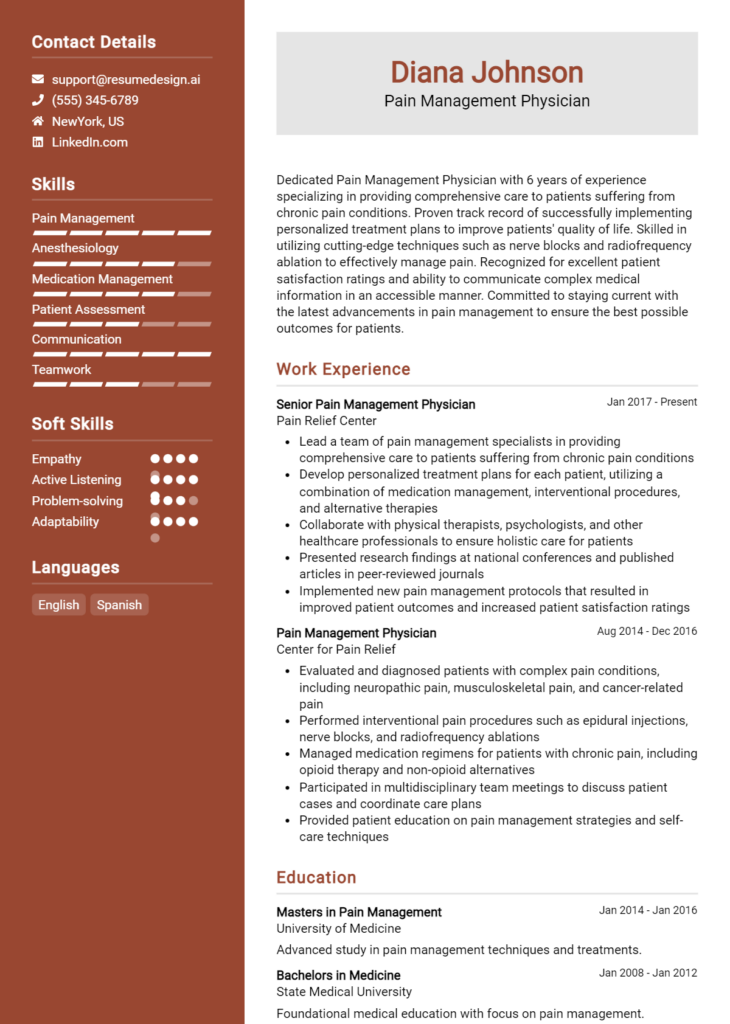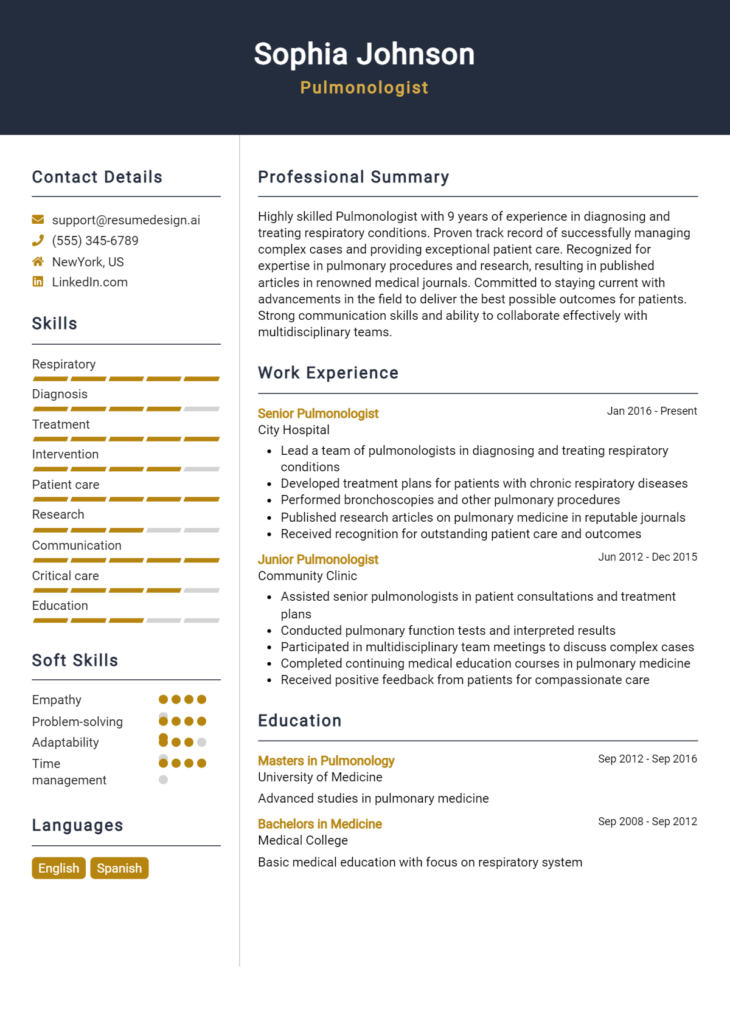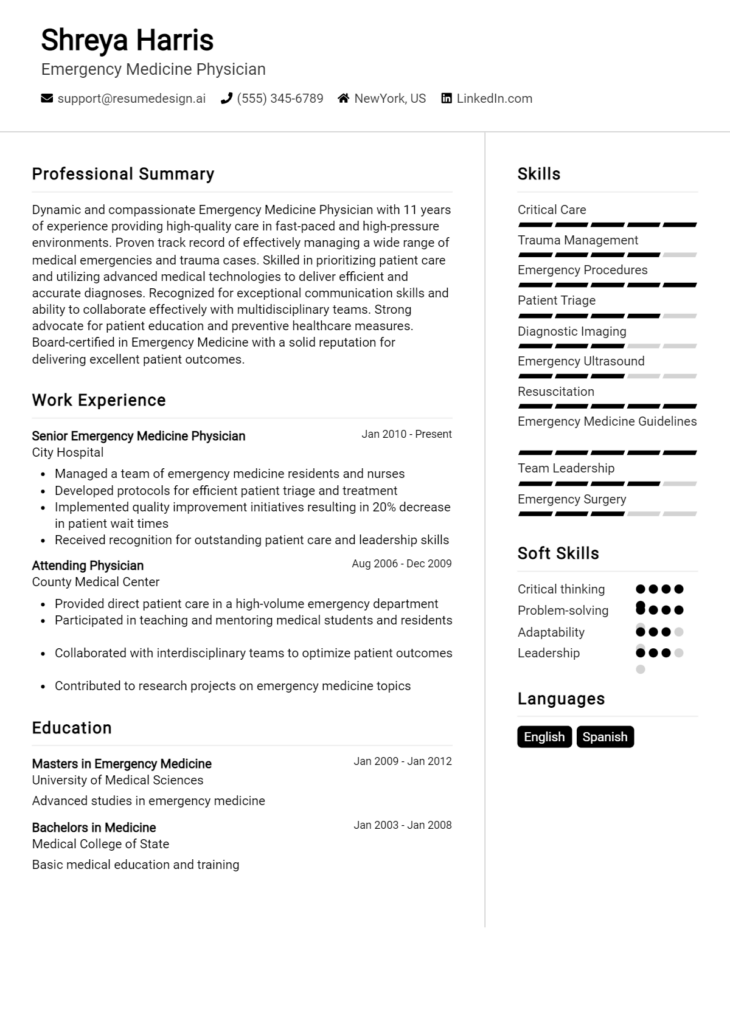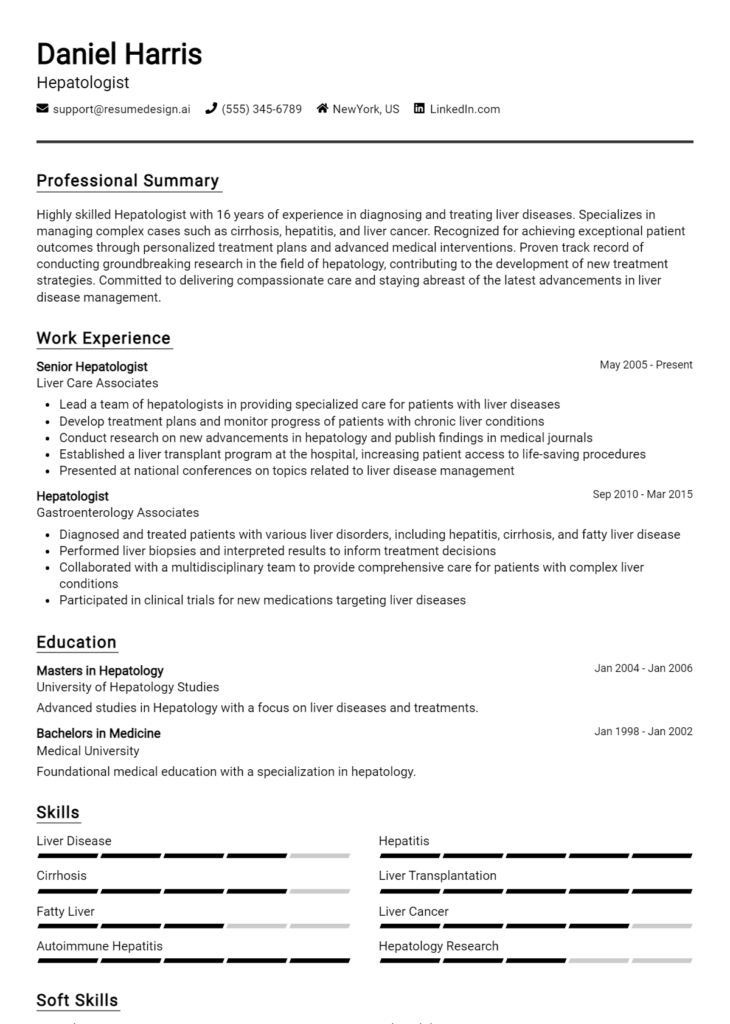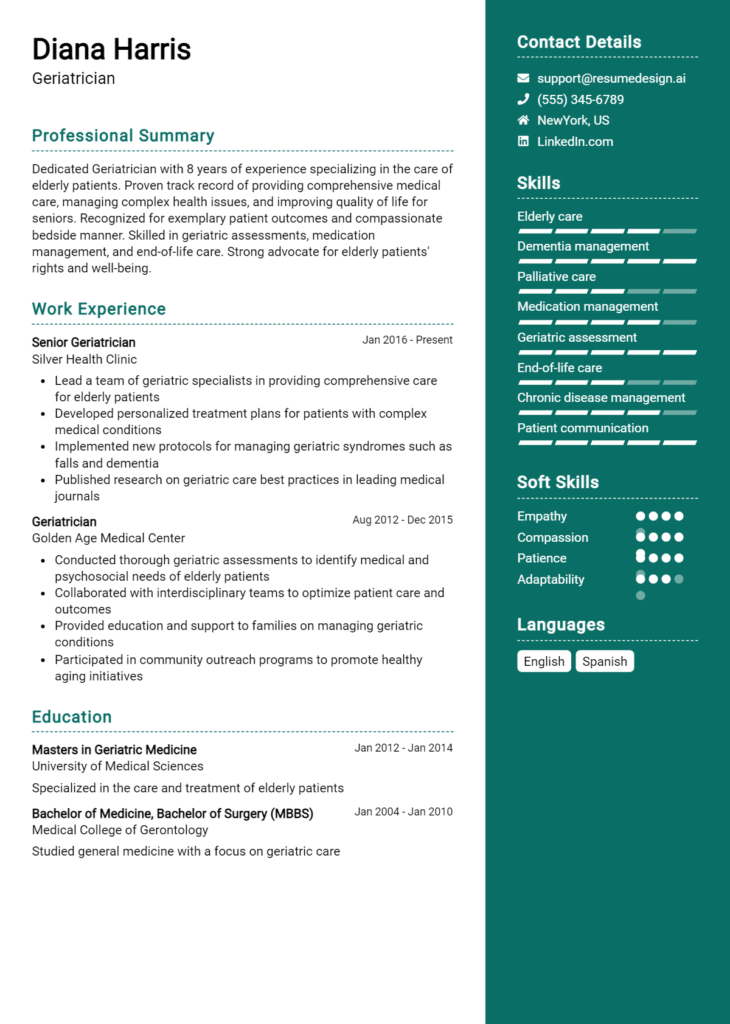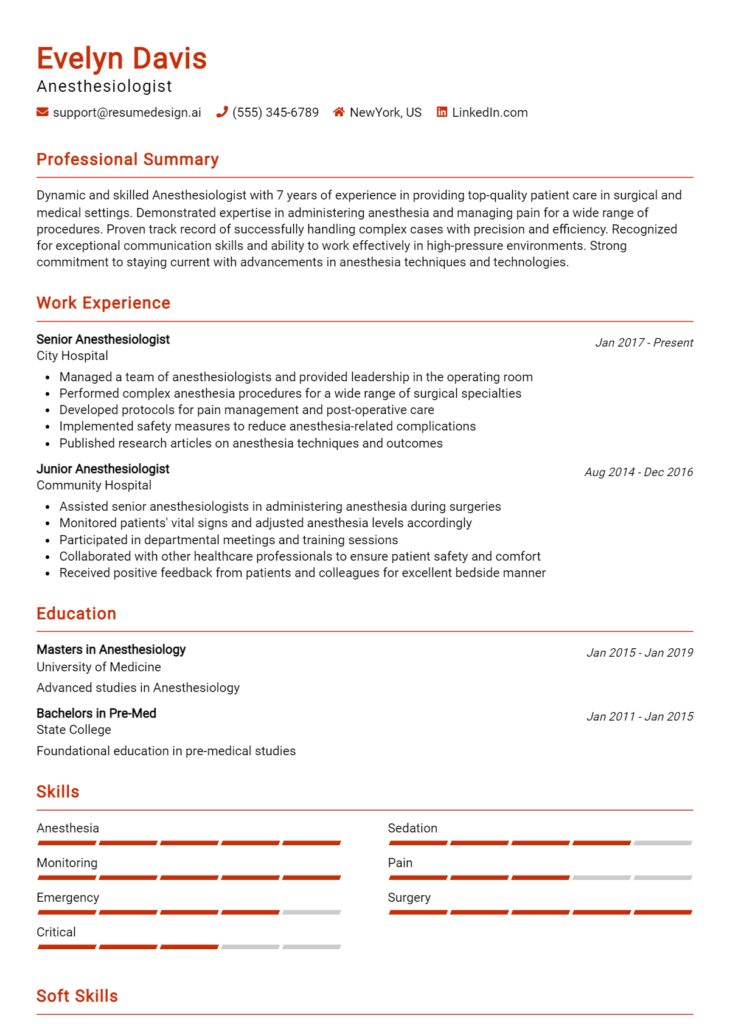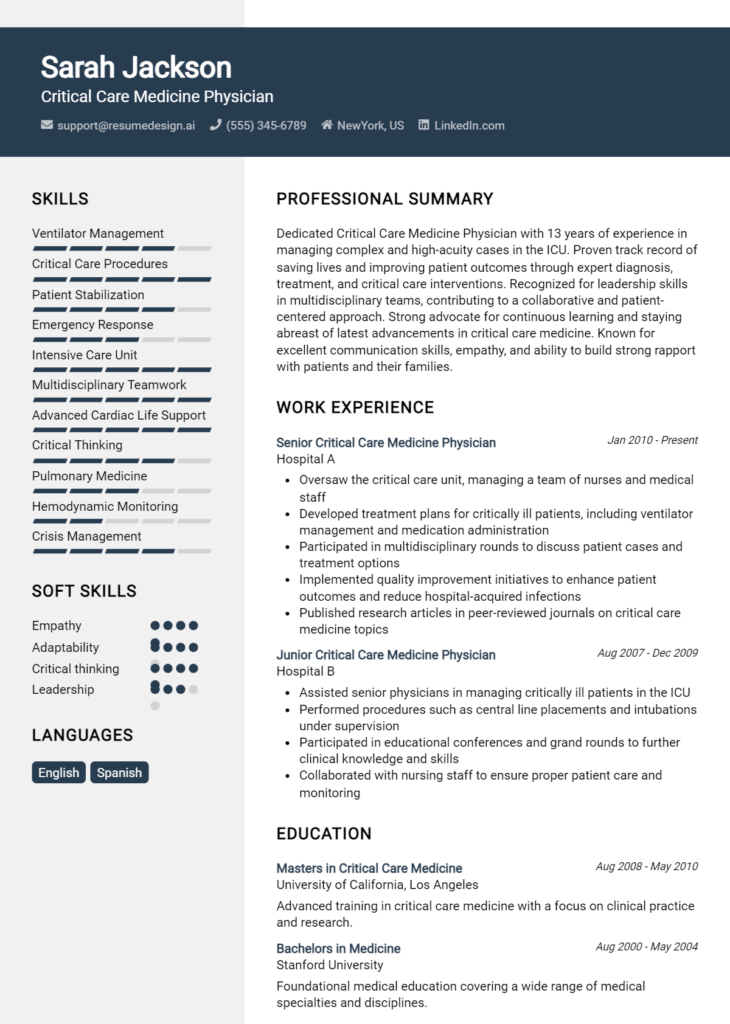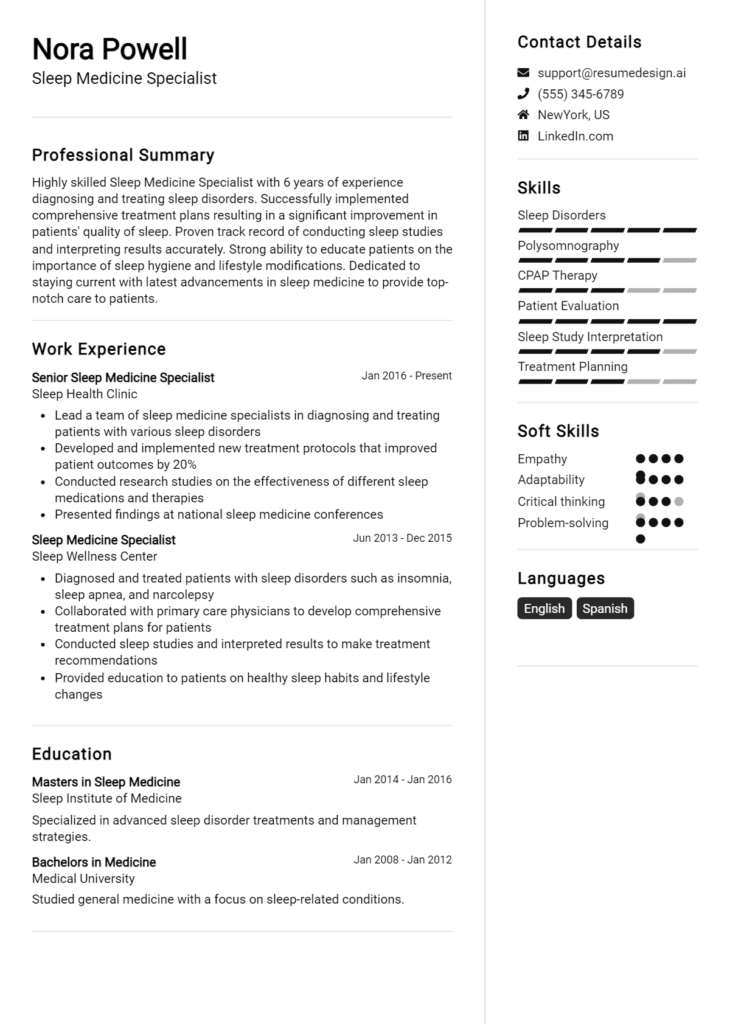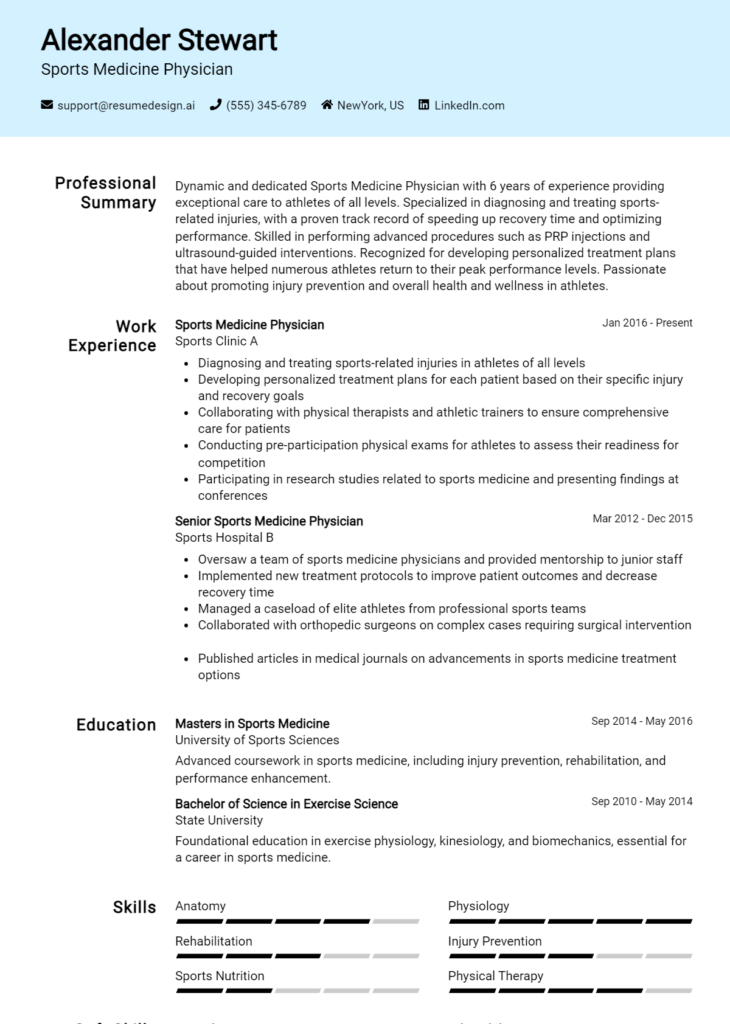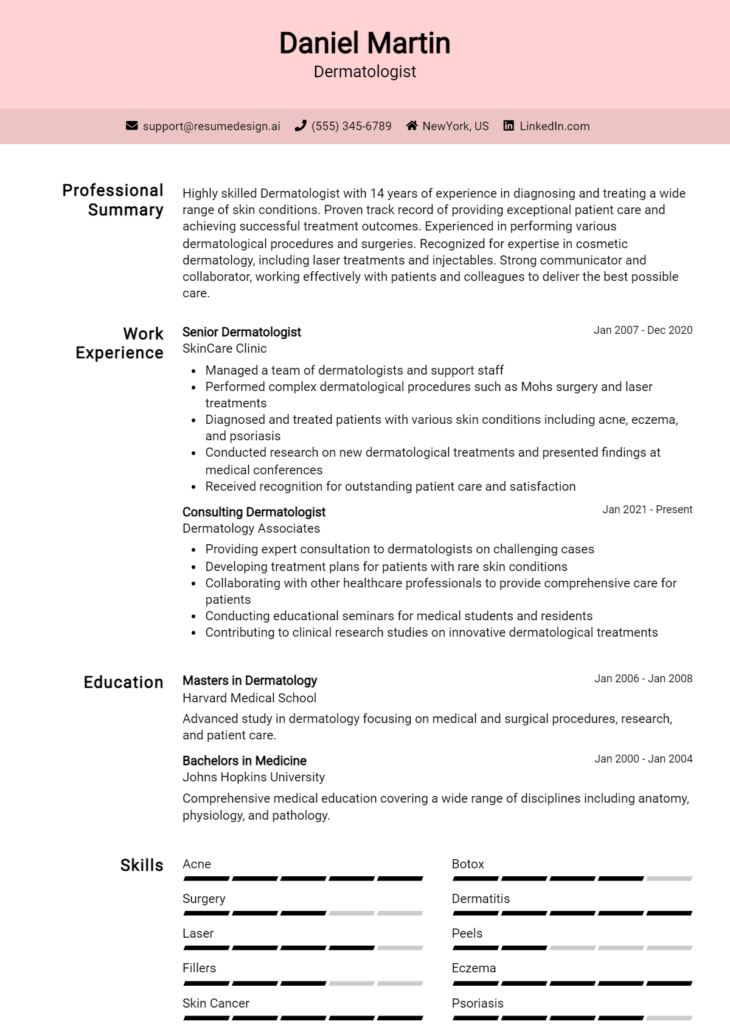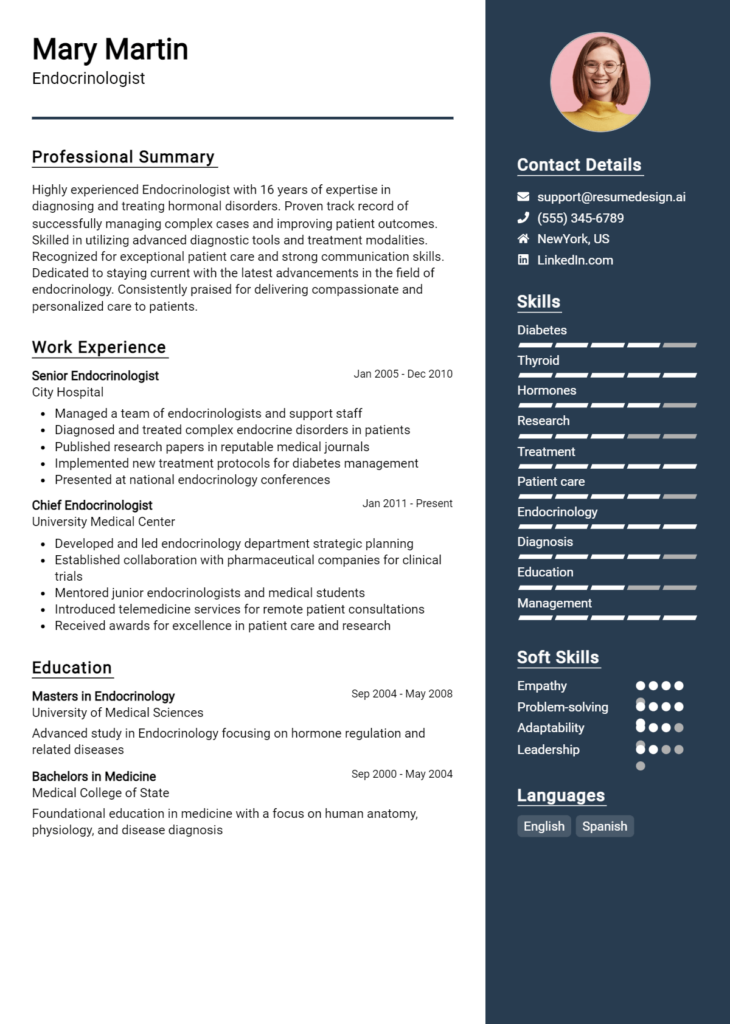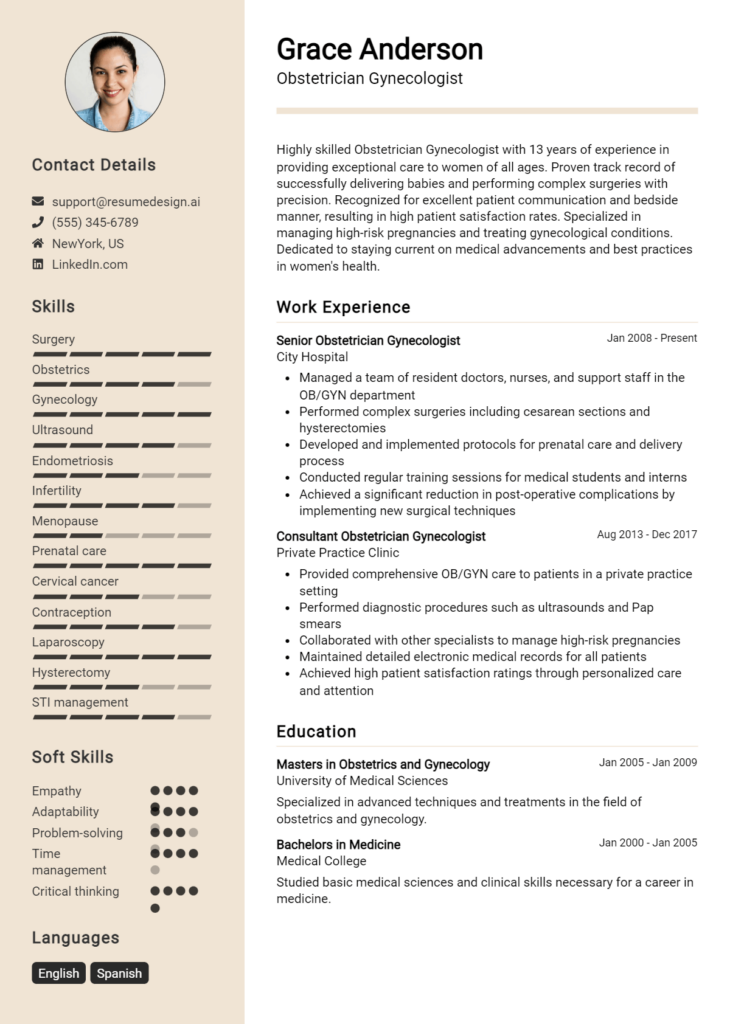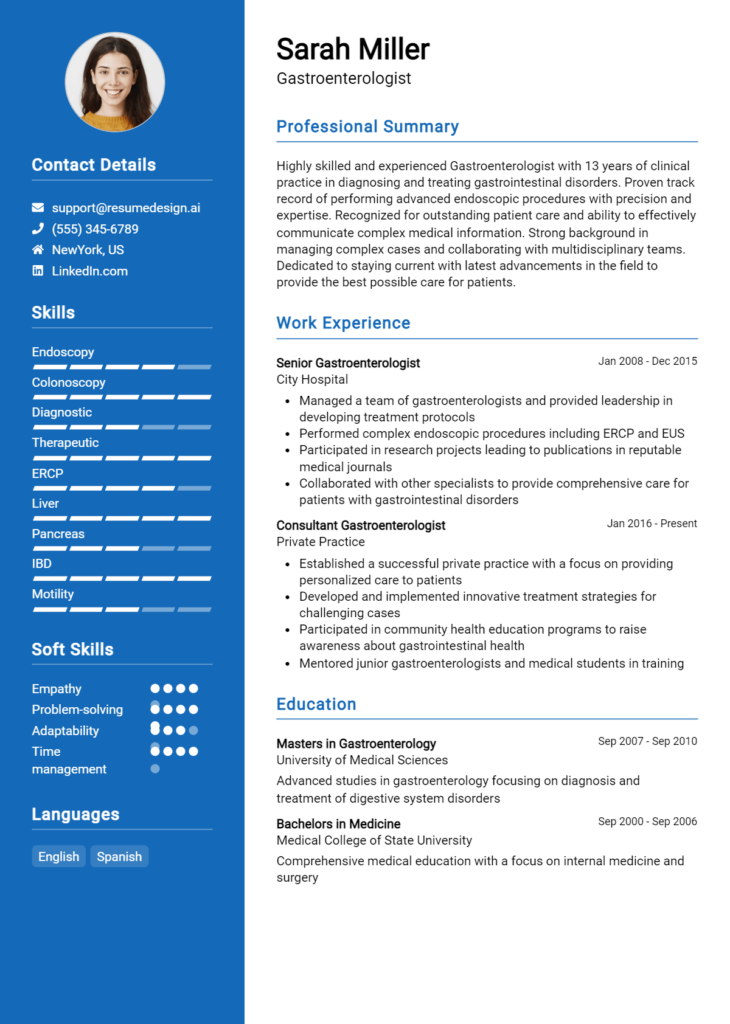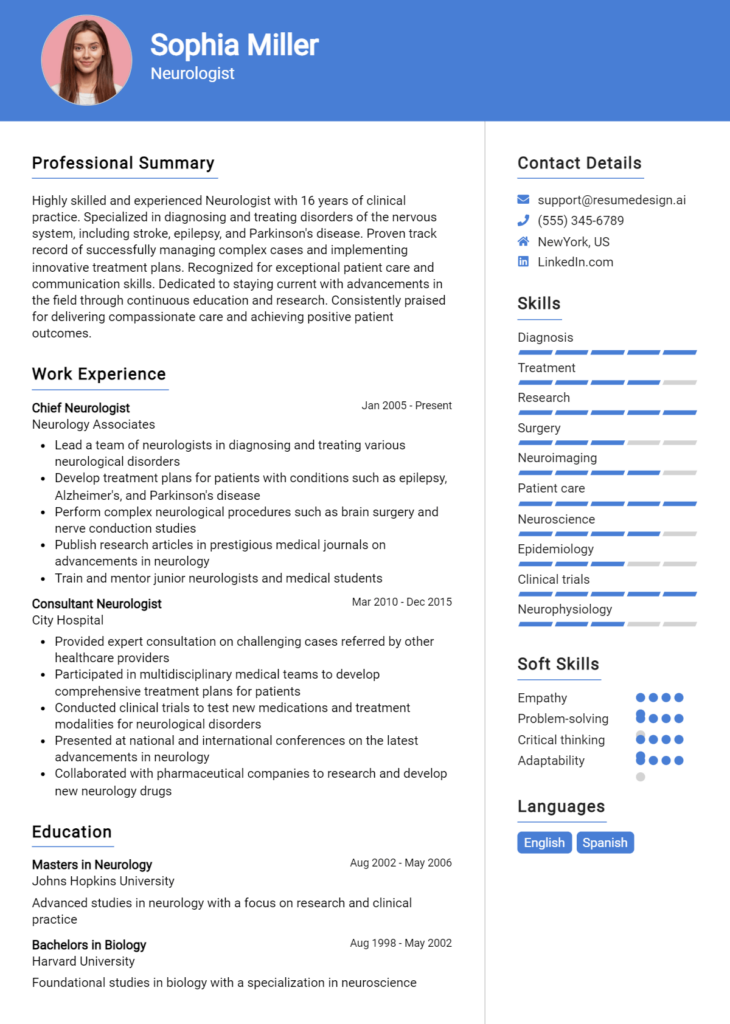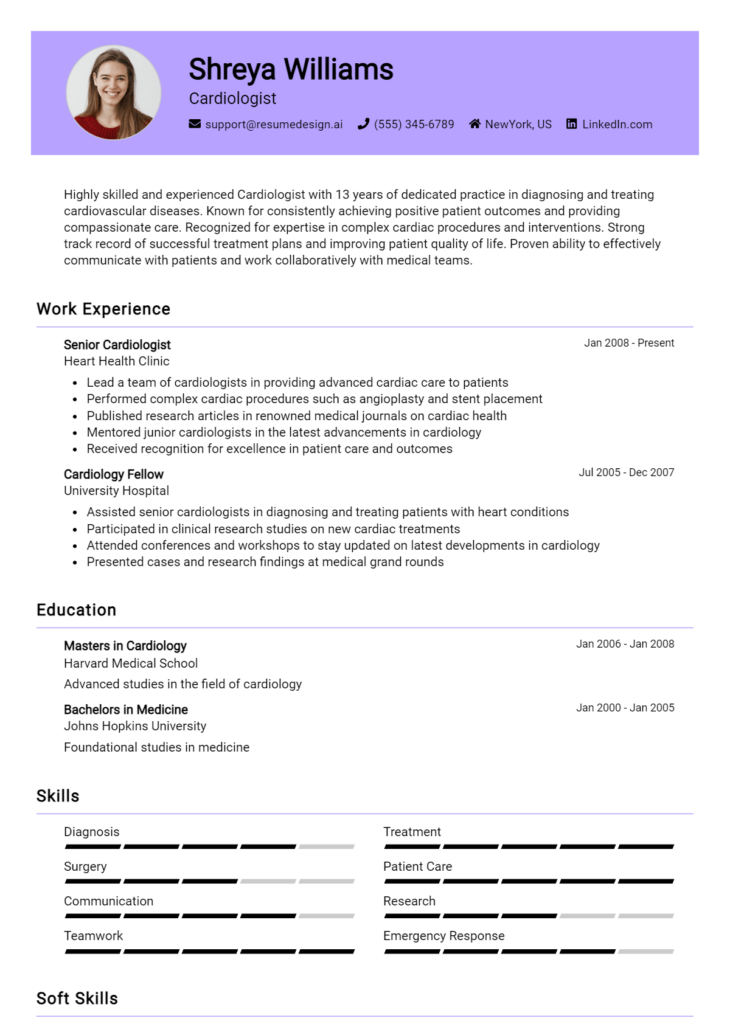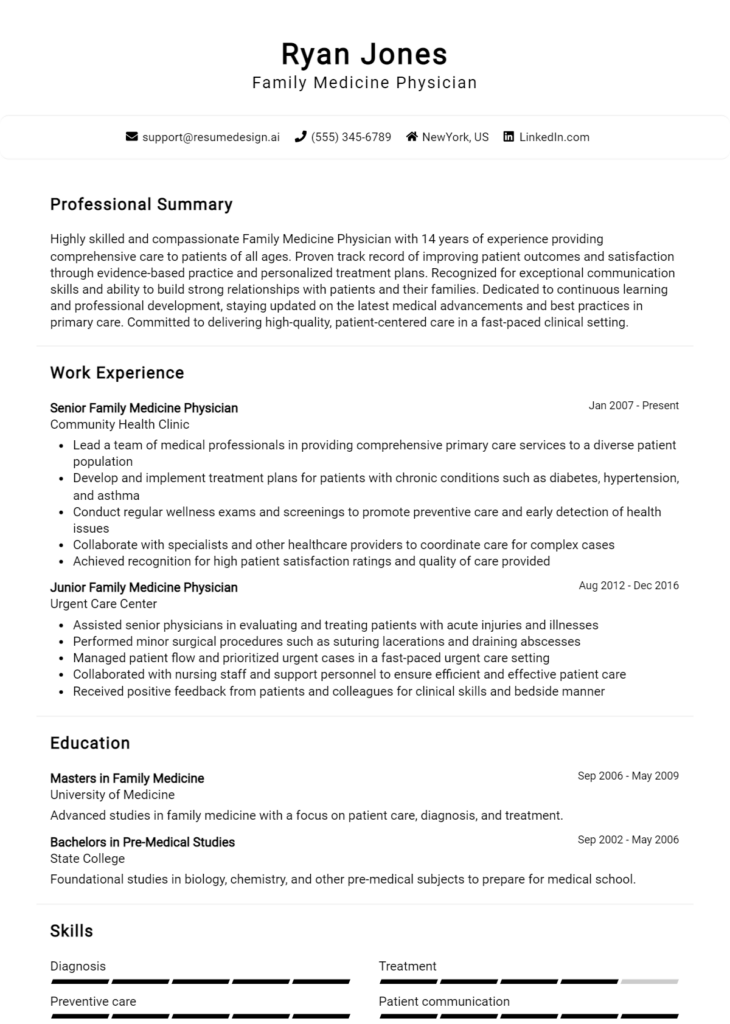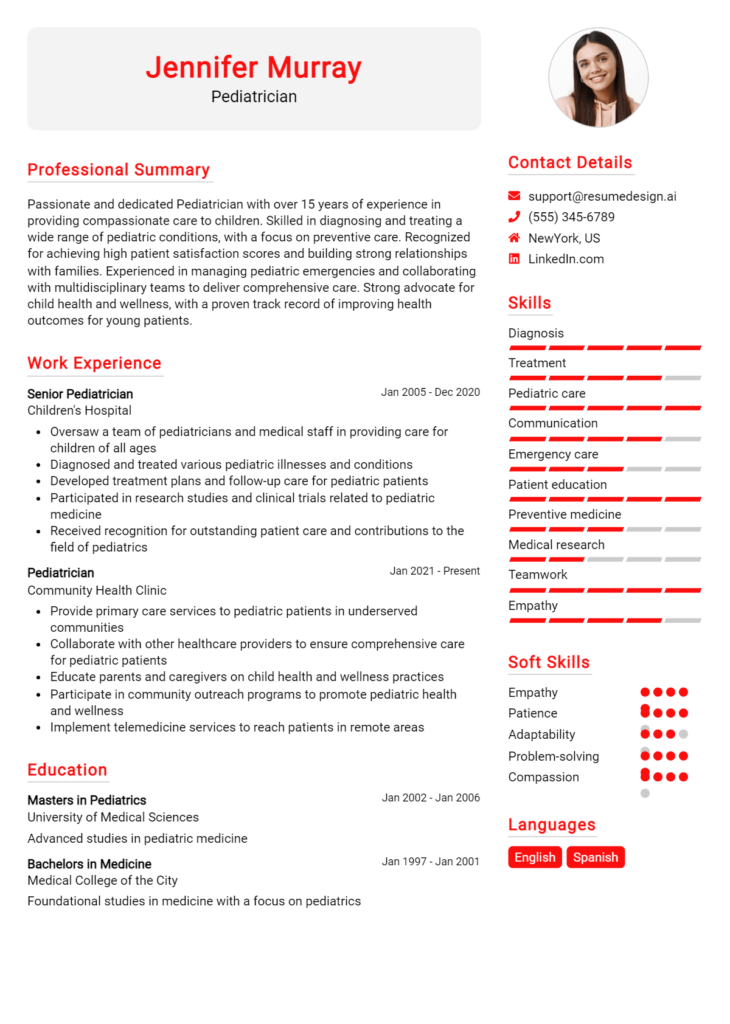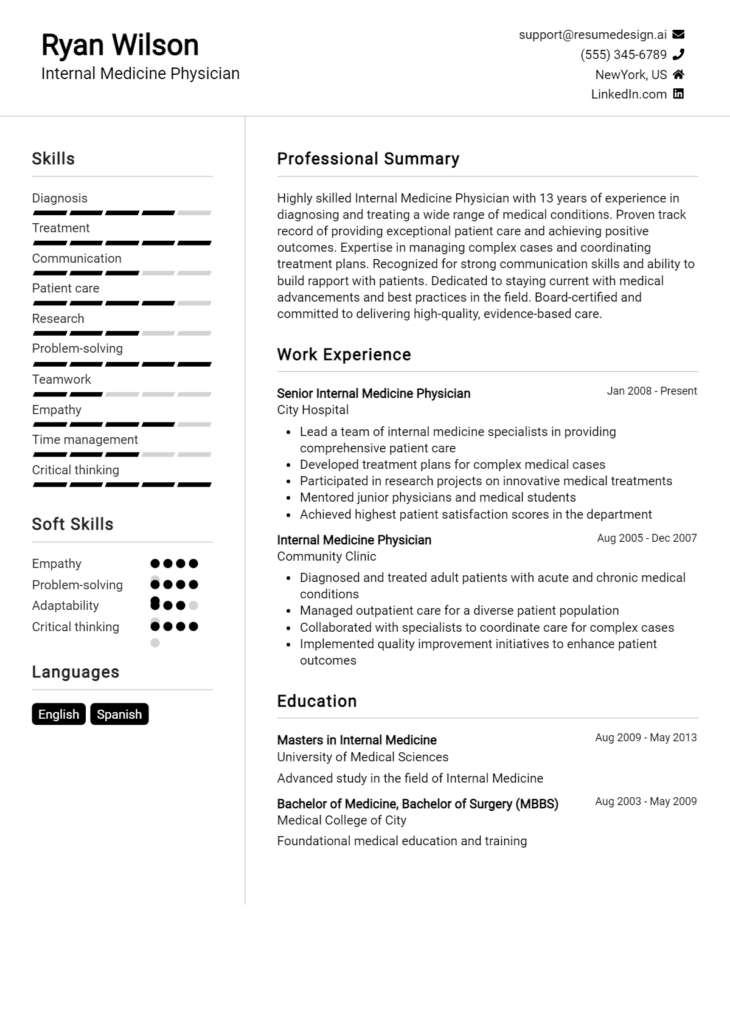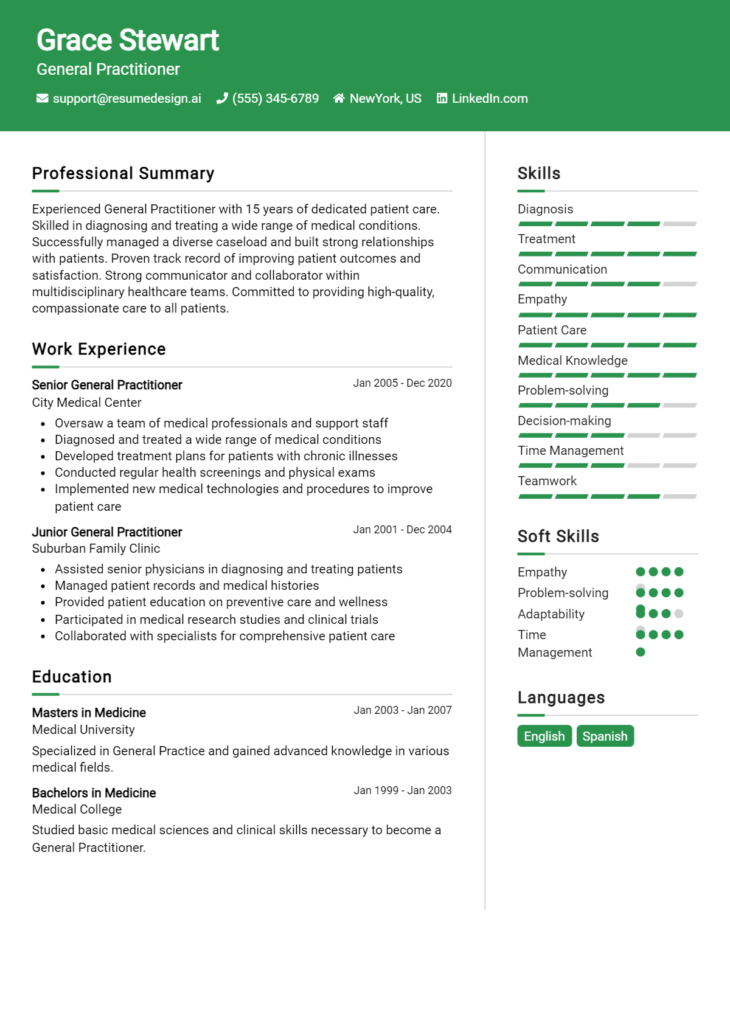Oncologist Core Responsibilities
Oncologists play a crucial role in diagnosing and treating cancer, requiring a blend of technical knowledge, operational expertise, and problem-solving skills. They collaborate with various departments, including pathology, radiology, and surgery, to ensure comprehensive patient care. Effective communication and analytical abilities are vital for interpreting complex data and developing personalized treatment plans. A well-structured resume highlighting these qualifications not only showcases an oncologist's expertise but also supports the organization's overarching goal of providing exceptional healthcare.
Common Responsibilities Listed on Oncologist Resume
- Conduct comprehensive patient assessments and cancer screenings.
- Analyze diagnostic tests and imaging results to determine cancer stages.
- Develop and implement individualized treatment plans.
- Administer chemotherapy, immunotherapy, and other cancer treatments.
- Monitor patient progress and adjust treatment as necessary.
- Collaborate with multidisciplinary teams for holistic patient care.
- Educate patients and families about cancer diagnosis and treatment options.
- Participate in clinical trials and research initiatives.
- Stay updated on advancements in oncology and treatment protocols.
- Maintain accurate patient records and documentation.
- Advise on palliative care and end-of-life options.
High-Level Resume Tips for Oncologist Professionals
A well-crafted resume is crucial for Oncologist professionals looking to make a meaningful impact in the competitive healthcare landscape. As the first impression a candidate makes on a potential employer, the resume needs to effectively showcase not only medical expertise but also relevant skills and achievements. A strong resume can differentiate an oncologist from other candidates, emphasizing their unique qualifications and commitment to patient care. In this guide, we will provide practical and actionable resume tips specifically tailored for Oncologist professionals, ensuring your application stands out in a crowded field.
Top Resume Tips for Oncologist Professionals
- Tailor your resume to align with the specific job description by incorporating relevant keywords and phrases.
- Highlight your clinical experience, focusing on specific oncology practices and patient demographics you have worked with.
- Quantify your achievements, such as the number of patients treated, research studies published, or successful treatment protocols developed.
- Showcase your certifications, licenses, and any specialized training in oncology or related fields.
- Emphasize your contributions to multidisciplinary teams and collaborative care approaches.
- Include any leadership roles or committee memberships that demonstrate your dedication to advancing oncology practices.
- Utilize a clear and professional format that makes it easy for hiring managers to quickly identify your strengths.
- Incorporate details about your participation in continuing education, conferences, or workshops relevant to oncology.
- Consider adding a brief summary statement at the top of your resume that encapsulates your career goals and key qualifications.
By implementing these tips, Oncologist professionals can significantly enhance their resumes, increasing their chances of landing a job in the field. A focused and well-structured resume can effectively communicate your qualifications and passion for oncology, making a compelling case for your candidacy and positioning you for success in your career journey.
Why Resume Headlines & Titles are Important for Oncologist
In the competitive field of oncology, a well-crafted resume headline or title is essential for capturing the attention of hiring managers and effectively summarizing a candidate's qualifications. A strong headline serves as a powerful first impression, conveying a candidate's expertise in a concise and impactful manner. It not only highlights relevant skills and experience but also aligns directly with the specific requirements of the job being applied for. A compelling headline can set the tone for the entire resume, making it crucial for oncologists to showcase their strengths right from the outset.
Best Practices for Crafting Resume Headlines for Oncologist
- Keep it concise: Aim for a headline that is brief yet informative, ideally no more than 10 words.
- Be role-specific: Tailor the headline to reflect specific qualifications and experiences relevant to oncology.
- Highlight key strengths: Focus on unique skills or accomplishments that differentiate you from other candidates.
- Use industry keywords: Incorporate terminology relevant to oncology to ensure alignment with job descriptions.
- Avoid jargon: Ensure that the language used is clear and understandable to a broad audience.
- Make it impactful: Use strong action words or phrases that convey confidence and expertise.
- Reflect your career goals: Align the headline with your professional aspirations within the field of oncology.
- Update regularly: Revise your headline for different applications to ensure it is always relevant.
Example Resume Headlines for Oncologist
Strong Resume Headlines
Compassionate Oncologist with 10+ Years in Patient-Centered Care
Board-Certified Oncologist Specializing in Innovative Treatment Protocols
Experienced Clinical Research Oncologist Driven by Evidence-Based Practices
Dedicated Oncologist Committed to Advancing Cancer Care through Research
Weak Resume Headlines
Oncologist Seeking New Opportunities
Experienced Doctor in the Medical Field
The strong resume headlines are effective because they immediately communicate specific qualifications, reflect relevant experience, and demonstrate a clear focus on the oncology field. They use descriptive language that not only captures attention but also provides insight into the candidate's expertise. In contrast, the weak headlines fail to impress due to their vagueness and lack of specificity, making them forgettable and less engaging for hiring managers. A strong headline is a powerful tool that can significantly enhance an oncologist's chances of standing out in a crowded job market.
Writing an Exceptional Oncologist Resume Summary
A well-crafted resume summary is crucial for oncologists as it serves as the first impression on hiring managers. This brief yet impactful section allows candidates to highlight their essential skills, relevant experience, and significant accomplishments in a concise manner. A strong summary not only captures attention but also sets the tone for the rest of the resume, making it easier for employers to see the candidate's potential fit for the role. Tailoring the summary to the specific job application ensures that it resonates with the employer’s needs, effectively showcasing the candidate's unique qualifications.
Best Practices for Writing a Oncologist Resume Summary
- Quantify achievements where possible, using numbers to illustrate impact.
- Focus on key skills relevant to oncology, such as patient care, treatment planning, and clinical research.
- Tailor the summary to align with the specific job description to enhance relevance.
- Keep it concise, ideally between 2-4 sentences, to maintain clarity and impact.
- Highlight unique qualifications, such as board certifications or specialized training in oncology.
- Use action-oriented language to convey confidence and professionalism.
- Incorporate keywords from the job posting to improve ATS (Applicant Tracking System) compatibility.
- Emphasize collaborative skills that demonstrate your ability to work effectively within a healthcare team.
Example Oncologist Resume Summaries
Strong Resume Summaries
Compassionate and results-driven oncologist with over 10 years of experience in managing complex cancer cases. Successfully implemented a patient-centric treatment model that improved patient satisfaction scores by 30% within one year.
Board-certified oncologist specializing in hematologic malignancies, with a proven track record of conducting clinical trials that resulted in a 25% increase in successful treatment outcomes. Committed to advancing cancer care through innovative research.
Experienced medical oncologist with expertise in personalized treatment plans for breast cancer patients. Achieved a 40% reduction in chemotherapy-related side effects through tailored therapeutic strategies, enhancing overall patient quality of life.
Weak Resume Summaries
Oncologist with several years of experience looking for a new position.
Dedicated healthcare professional interested in oncology.
The strong resume summaries are effective because they provide specific details about the candidate's experience, quantify achievements, and directly relate to the role of an oncologist. They convey confidence and a clear value proposition to potential employers. In contrast, the weak summaries lack detail and measurable outcomes, making them feel generic and unimpressive. They fail to highlight the candidate's unique qualifications or contributions to the field, which can lead to missed opportunities in a competitive job market.
Work Experience Section for Oncologist Resume
The work experience section of an Oncologist's resume is crucial as it not only highlights the candidate's technical skills but also demonstrates their ability to manage teams and deliver high-quality patient care. This section serves as a platform for candidates to showcase their expertise in oncology, detailing their involvement in groundbreaking treatments, clinical trials, and patient management strategies. By quantifying achievements and aligning their experience with industry standards, candidates can effectively illustrate their contributions to the field, making a compelling case for their candidacy.
Best Practices for Oncologist Work Experience
- Detail specific oncology-related technical skills, such as proficiency in chemotherapy administration and radiation therapy.
- Quantify achievements, such as the percentage of successful patient outcomes or improvements in treatment protocols.
- Highlight collaboration with multidisciplinary teams, including nurses, radiologists, and researchers.
- Include certifications or additional training that enhances clinical expertise.
- Describe leadership roles in directing clinical trials or patient education programs.
- Emphasize contributions to research publications or presentations at medical conferences.
- Showcase experience in utilizing electronic health records (EHR) systems efficiently.
- Present a clear narrative of career progression within oncology to showcase growth and experience.
Example Work Experiences for Oncologist
Strong Experiences
- Led a multidisciplinary team in a clinical trial for a novel immunotherapy, resulting in a 30% increase in patient survival rates over a two-year period.
- Implemented a new patient management protocol that reduced hospital readmission rates by 25%, significantly improving patient outcomes.
- Published research on targeted therapies in a peer-reviewed oncology journal, contributing to the advancement of treatment options in breast cancer.
- Collaborated with a team of radiologists to develop a comprehensive imaging protocol, enhancing the accuracy of tumor staging by 40%.
Weak Experiences
- Worked with patients in an oncology setting.
- Participated in some clinical trials.
- Helped with patient management and treatment planning.
- Attended meetings related to oncology.
The examples provided illustrate the distinction between strong and weak experiences. Strong experiences are characterized by specific achievements and quantifiable outcomes that clearly demonstrate the candidate's technical expertise and leadership capabilities. In contrast, weak experiences lack detail and specificity, failing to convey the candidate's impact or contributions to the field of oncology. By focusing on measurable results and relevant experiences, candidates can create a compelling narrative that resonates with potential employers.
Education and Certifications Section for Oncologist Resume
The education and certifications section of an Oncologist's resume is crucial for demonstrating the candidate's academic prowess, specialized knowledge, and commitment to ongoing professional development in the field of oncology. This section not only highlights the candidate's formal education, such as medical degrees and residencies, but also showcases industry-relevant certifications and specialized training that enhance their expertise. By presenting relevant coursework and continuous learning efforts, candidates can significantly boost their credibility and align their qualifications with the expectations of potential employers, ensuring they stand out in a competitive job market.
Best Practices for Oncologist Education and Certifications
- Include relevant degrees such as MD or DO, emphasizing any specialization in oncology.
- List industry-recognized certifications such as Board Certification in Medical Oncology.
- Highlight advanced training or fellowships specifically related to oncology.
- Incorporate relevant coursework that aligns with oncology practices, such as cancer biology or treatment protocols.
- Update the section with any recent certifications or trainings to reflect continuous learning.
- Ensure all information is presented in reverse chronological order for easy readability.
- Consider including honors or awards received during educational pursuits to demonstrate excellence.
- Use clear and concise language to effectively communicate qualifications and relevance to the job role.
Example Education and Certifications for Oncologist
Strong Examples
- Doctor of Medicine (MD), Harvard Medical School, Graduated 2015
- Fellowship in Medical Oncology, Johns Hopkins University, Completed 2018
- Board Certified in Medical Oncology, American Board of Internal Medicine, Certified 2019
- Advanced Training in Clinical Research, National Cancer Institute, Completed 2021
Weak Examples
- Bachelor of Arts in Psychology, State University, Graduated 2010
- Certification in Basic Life Support (BLS), Expired 2020
- Coursework in General Medicine, Completed 2012 (not oncology-specific)
- Certification in Health Coaching, Received 2019 (not relevant to oncology)
The examples provided demonstrate a clear distinction between strong and weak qualifications. Strong examples highlight relevant degrees, specialized training, and current certifications that align with the oncologist role, showcasing the candidate's expertise and commitment to the field. In contrast, weak examples feature outdated or irrelevant educational qualifications and certifications that do not contribute to the candidate's credibility as an oncologist, potentially detracting from their overall appeal to employers.
Top Skills & Keywords for Oncologist Resume
As an oncologist, possessing the right skills is crucial for delivering effective patient care and navigating the complexities of cancer treatment. A well-crafted resume highlights key competencies that demonstrate expertise, compassion, and problem-solving abilities. Employers seek candidates who not only have a robust medical knowledge base but also excel in communication and interpersonal skills. These attributes ensure oncologists can effectively collaborate with multidisciplinary teams and provide the emotional support necessary for patients facing challenging diagnoses. Including relevant skills in your resume can significantly enhance your chances of standing out in this competitive field.
Top Hard & Soft Skills for Oncologist
Soft Skills
- Empathy
- Communication
- Active Listening
- Team Collaboration
- Problem-Solving
- Time Management
- Adaptability
- Leadership
- Critical Thinking
- Patient Advocacy
- Emotional Intelligence
- Conflict Resolution
- Decision Making
- Stress Management
Hard Skills
- Oncology Knowledge
- Cancer Treatment Protocols
- Chemotherapy Administration
- Radiation Therapy Techniques
- Diagnostic Imaging Interpretation
- Patient Assessment
- Clinical Research Skills
- EHR (Electronic Health Record) Proficiency
- Surgical Skills
- Familiarity with Clinical Trials
- Palliative Care Expertise
- Knowledge of Oncology Pharmacology
- Familiarity with Genetic Testing
- Patient Management Systems
- Data Analysis and Interpretation
- Regulatory Compliance
- Knowledge of Supportive Care
By emphasizing both soft and hard skills in your resume, you can effectively showcase your qualifications and readiness to excel in the demanding realm of oncology. Additionally, highlighting relevant work experience can further solidify your candidacy by providing concrete examples of how you’ve applied these skills in real-world scenarios.
Stand Out with a Winning Oncologist Cover Letter
I am writing to express my interest in the Oncologist position at [Hospital/Institution Name] as advertised on [where you found the job posting]. With a robust background in oncology and a strong commitment to providing compassionate patient care, I am excited about the opportunity to contribute to your esteemed team. My extensive training and experience in managing diverse patient populations, coupled with my dedication to ongoing education and research in cancer treatment, make me a strong candidate for this role.
Throughout my career, I have successfully diagnosed and treated a wide range of malignancies, employing both traditional and innovative therapies. My approach emphasizes patient-centered care, where I prioritize open communication and collaboration with patients and their families. I believe that empowering patients with knowledge about their treatment options is crucial for their emotional and physical well-being. In my previous role at [Previous Institution Name], I led a multidisciplinary team in developing personalized treatment plans and participated in clinical trials that explored cutting-edge therapies, which not only benefited my patients but also contributed to the advancement of oncological care.
Moreover, I am passionate about educating the next generation of oncologists. I have had the privilege of mentoring medical residents and conducting seminars on the latest advancements in cancer treatment. I am eager to bring this same enthusiasm for teaching to [Hospital/Institution Name], fostering a collaborative and innovative learning environment. I am also committed to participating in community outreach programs that promote cancer awareness and prevention, as I believe that education plays a critical role in combating this disease.
I am excited about the possibility of joining [Hospital/Institution Name] and contributing to your mission of providing exceptional cancer care. I look forward to the opportunity to discuss how my skills and experiences align with the needs of your team. Thank you for considering my application. I hope to speak with you soon.
Common Mistakes to Avoid in a Oncologist Resume
When crafting a resume for an oncologist position, it's crucial to present a well-structured document that highlights your medical expertise, research experience, and patient care skills. However, many candidates make common mistakes that can detract from their qualifications and reduce their chances of landing an interview. Below are some pitfalls to avoid when creating your oncologist resume:
Vague Job Descriptions: Failing to provide specific details about your roles and responsibilities can leave hiring managers unsure of your expertise. Use precise language to describe your clinical duties and achievements.
Neglecting Research Contributions: Oncologists often engage in significant research. Omitting your research experience or publications can make your resume less competitive. Always include relevant studies, trials, and outcomes.
Lack of Certifications: Not mentioning board certifications or specialized training can diminish your qualifications. Ensure that your certifications are prominently displayed to showcase your professional standing.
Ignoring Soft Skills: While technical skills are essential, soft skills such as communication, empathy, and teamwork are equally important in oncology. Highlight these attributes to demonstrate your ability to interact effectively with patients and colleagues.
Using Generic Templates: Utilizing a one-size-fits-all resume template can make your application blend in with others. Tailor your resume to reflect your unique experiences and the specific requirements of the position.
Overcomplicating Language: Using overly complex medical jargon or convoluted sentences can make your resume difficult to read. Aim for clarity and simplicity to ensure that hiring managers can easily grasp your qualifications.
Not Quantifying Achievements: Failing to include metrics or outcomes related to your clinical work can weaken your resume. Whenever possible, quantify your contributions with data, such as patient recovery rates or the number of successful treatments.
Inconsistent Formatting: A resume with inconsistent fonts, sizes, or spacing can appear unprofessional. Maintain uniformity in formatting to create a polished and cohesive document that reflects your attention to detail.
Conclusion
As an oncologist, your role is crucial in diagnosing and treating cancer, with a focus on improving patient outcomes through personalized care and innovative treatment options. Throughout your career, you will encounter a variety of cases, stay updated with the latest research, and collaborate with multidisciplinary teams to provide comprehensive care. Key skills include strong analytical abilities, empathy, and effective communication, all of which are essential to build trust with patients and their families.
In this competitive field, having a well-crafted resume is vital to stand out among other candidates. It should highlight your education, clinical experience, research contributions, and any specialized training you have received. Tailoring your resume to showcase your unique qualifications and achievements can make a significant difference in landing interviews.
As you prepare or update your oncologist resume, consider utilizing various resources available to enhance your application. Explore our resume templates to find a design that fits your professional style. Use our resume builder for a step-by-step process to create a polished document. Check out resume examples for inspiration on how to structure your resume effectively. Additionally, don’t overlook the importance of a compelling introduction; our cover letter templates can help you craft a persuasive narrative to accompany your resume.
Now is the time to take action! Review and refine your oncologist resume using these tools to ensure you present your best self to potential employers. Your expertise in oncology deserves to be showcased effectively, so don’t wait—start enhancing your resume today!

